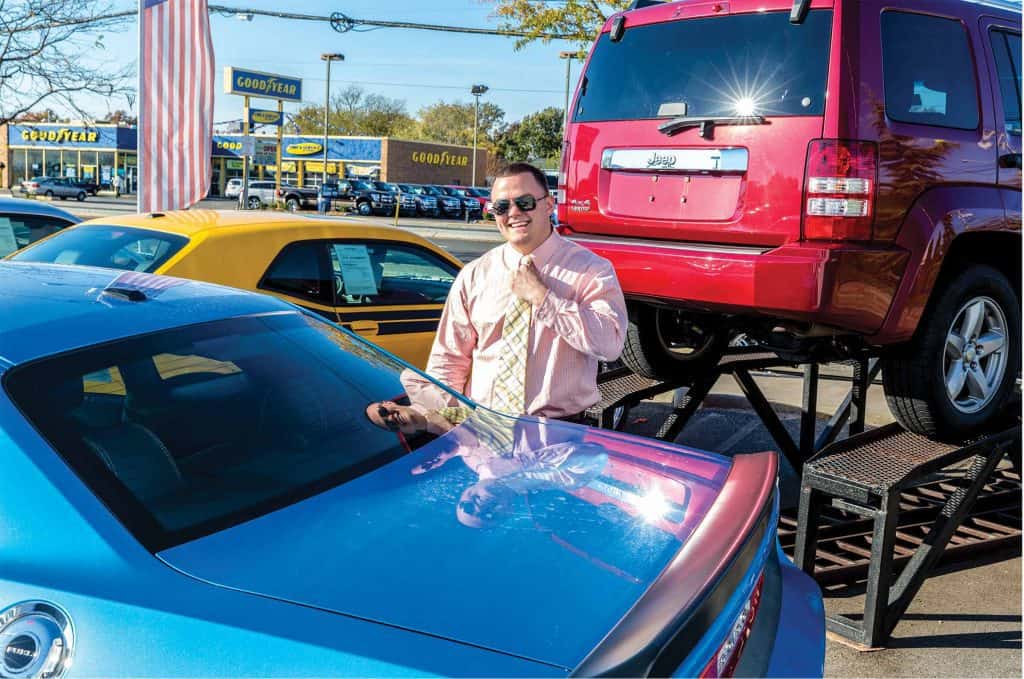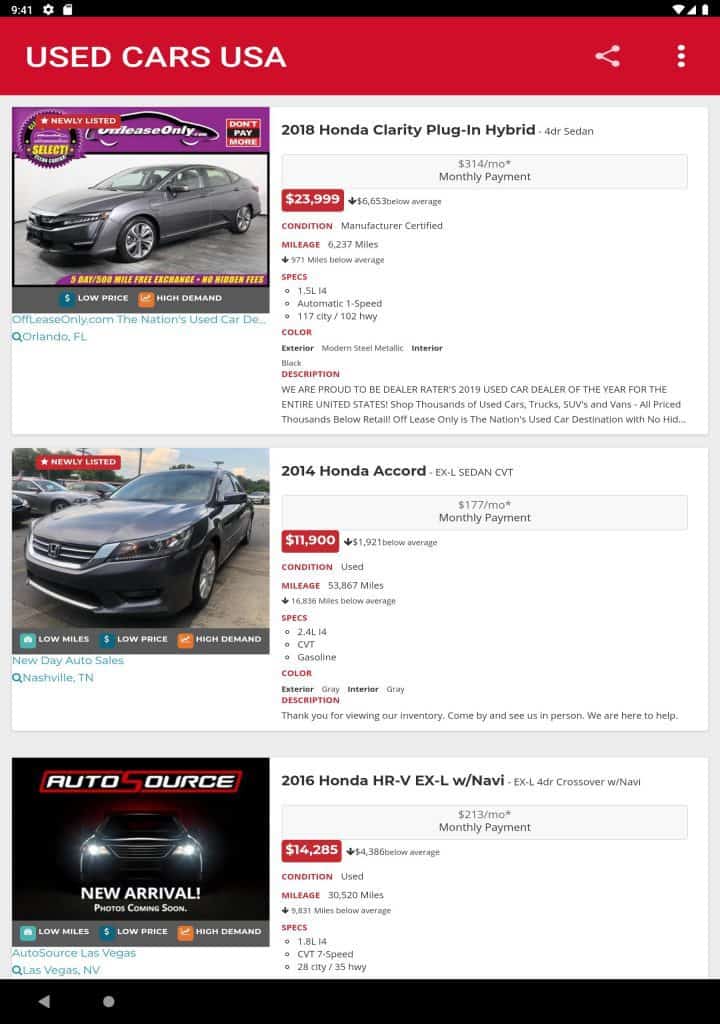How Much Discount Can You Get Off a Used Car

Just about everyone expects to pay less for a used car than the amount it's being advertised for, and it's been that way for as long as most of us can remember. However, do you know what sort of discount you should realistically expect to get or how much below the asking price your first offer should be when negotiating the price of a used car? In this article, I'm going to tell you how much you should pay for a used car, compared to the price the seller is asking.
The discount you should expect on a used car is the difference between the asking price and the realistic market value for that specific vehicle. If the average selling price for the vehicle you are interested in buying is $10,500 in your local area and the seller is asking $12,500, a $2,000 discount or even a little more is about what you should expect. If they're asking $15,000 you should expect a $4,500 discount or a little more, but it doesn't alter the value of the car and it doesn't mean you've necessarily got a better deal than the first example.
Data gathered by the website iSeeCars.com suggests dealers drop the asking price of a used vehicle between one and six times in the first 31.5 days of it being offered for sale, and the average first drop is around 5%. That's just an average though, and how much discount you should expect on the used car, truck, van or SUV you're interested in could be a lot more or a lot less than that, depending on the specific circumstances.
By the way, if you'd like to know about some of the very best products, services and companies I've found for buying, selling, and helping with vehicle ownership then please check out my recommended products and services page right here. As well as telling you where to go to get the very lowest prices on new and used vehicles, I also cover finance, insurance, parts, detailing and other stuff too.
How much should you offer?
When you go to negotiate the price of a used car for sale you're perfectly entitled to offer as little as you want, but insulting the dealer or owner isn't going to be a good starting point. One thing's for sure though; if the seller accepts your first offer you've certainly offered too much and you could have got the car for less if you'd done your homework.
There's no exact percentage you should use to open your negotiation, so the answer is for you to do some research and learn what a reasonable price is for that vehicle in your local market. Remember it's your local market that matters here. In smaller countries like the UK, regional price differences are becoming less common as online used car sellers are selling, pricing and delivering nationally these days. Here in the US, there's no reason to expect the same price for a Buick Cascada in Boston as you'd get for the same car in San Diego, so make sure you do your homework.
Let's say you go on Autotrader and you're looking to buy a 2018 Ford Mustang Ecoboost and you live in Houston, TX. Put in a reasonable amount of detail such as the age, maximum mileage, and restrict the geographical search area to about 50 miles. Ignore the sponsored results and set the search preference from the lowest price to highest. At the time of writing, I can tell you there are lots of them selling for around $21,500. Therefore, if you are interested in one and the seller is asking $23,000 you wouldn't be out of order starting the bidding at something like $20,000. The chances are you'll then end up at around the $21,500 mark, which your research tells you is probably about correct.
Basically, the amount of discount you should get will depend on how much the seller is asking in the first place and how much the car is actually worth. You really do need to keep this at the forefront of your mind and not get carried away. Are you getting a better deal if you buy that Mustang for $21,500 from someone who was asking $26,000 or from someone asking $22,000? Unless the one priced higher to start off with has more going for it, such as lower miles, better service history or a more desirable color, it really doesn't matter as long as you end up paying the right price.

What about older cars?
The above is a fair explanation of how much discount should get based on the real-world value of the vehicle you're interested in when we're talking about average, run-of-the-mill used cars. When we start talking about much older cars, classic cars and barn finds, it's not out of the question to suggest that anything is possible.
I'm not talking here about a clapped-out 1979 Honda Civic with 390,000 miles though. I'm talking about the kind of vehicle you might want to restore or restomod. In these circumstances, it really is a case of every deal stands on its own, and it all comes down to how much the seller wants to sell and how much you want to buy that particular car. For example, you could find a 1969 Ford F100 on somebody's farm in the middle of Nowheresville for $6,000, but you could also find a similar truck advertised by someone who really knows what they have on their hands at double that amount or more.
You could tell someone asking $12,000 for their 1969 F100 there's another for sale in the next state at $6,000 and offer them $7,000. They might agree and you've just grabbed yourself a sweet $5,000 discount, but they're more likely to tell you to go and buy the one for $6,000 instead then.
Should you ALWAYS expect a discount?
If you're like the average person and you only buy a vehicle every few years or even less frequently, it's easy to fall into the trap of believing you will always pay less for a used vehicle than the asking price. In an awful lot of cases you should end up paying less than the asking price for a used car, but you also shouldn't take it for granted. There are certain circumstances where you will not get a discount of any sort on a used car, and I'm afraid to say those circumstances are getting more common.
Online-sellers
The used vehicle market has changed an awful lot over the last 10 to 15 years with more and more exclusively online sellers entering the market such as Carvana.com, Vroom.com and others. It's becoming more common for sites like these to operate a take-it-or-leave approach to selling used cars, so you're not going to be able to negotiate a discount like you would on a car lot or buying from a private seller on eBay, Autotrader or similar online marketplaces.
The exclusively online-sellers often don't buy their inventory in the same way as traditional car dealers, and a lot of the time they might not even own the inventory they're advertising. This relatively new way of retailing used vehicles often works on obtaining inventory on a sale-or-return basis from leasing and finance companies. These cars are priced pretty aggressively to the market so the margins are tight and you're not face-to-face with a salesperson, which why you're not going to be able to negotiate a discount in these circumstances.
If you'd like to know all about where used car dealers get their inventory, check out this article I've written on the subject. As well as revealing some stuff you probably don't know, this article will also help you decide where it might be best for you to buy your next used car from.
Traditional used car dealerships
If you're going to a used car dealership and buying a vehicle off the lot, you'd have to be pretty dumb to pay the full-up asking price a lot of the time. This is the "old-school" way of buying a used car and most of the time the dealer will expect you to haggle on the price, or at least to get extras thrown-in to "sweeten" the deal such as extended warranties, a full tank of gas, accessories, etc.
However, the way car dealerships price their inventory has also had to change in recent years, and this can sometimes lead to very tight margins in some cases. Dealers will now often price their inventory to the local area by doing online searches just the way you probably have done, to make sure the price they're asking is competitive enough to generate interest in a vehicle.
To learn more about how to value a vehicle like a dealer would you can check out this YouTube video I've produced on the subject.
Private sellers
Most private sellers will try and ask as much for their car as they think they possibly can, and these expectations can often be unrealistic. There's no way a private seller should expect to get as much as a dealer would be able to command for the same vehicle because a private seller isn't offering the warranty and assurances you get from a dealership. Buying from a private seller is more of a risk, so the price you eventually end up paying and the amount of discount you should negotiate need to reflect this.

Exceptional circumstances
There are also exceptional circumstances where you have less or even no chance of negotiating down the asking price of a used car. If the car is rare, exceptional, or extremely sought-after, it's not unreasonable for the seller to stick to their asking price. In some cases, when an exceptional vehicle is advertised for sale you can even find some people being prepared to offer more than the asking price to purchase the vehicle.
Economic circumstances can also reduce your chances of getting money off a used vehicle, and I can cite two recent examples. When the financial crash happened in 2007/8 the new car market almost ground to a halt. The demand for used cars increased significantly, but the supply of new used car inventory was restricted as dealerships weren't getting trade-ins because new cars weren't selling. This situation saw used car prices increasing as each month passed and this was the total opposite of how things usually work, which is that a used car for sale reduces in value as each month goes by. The coronavirus pandemic has seen a similar situation emerge, although it's not been as widespread or sustained as the global financial crisis of 2007/8.
Conclusion
A used car or any other used vehicle for sale is worth what it's worth in the current market, so don't get fixated on a specific sum or percentage you expect to get as a discount. Knowledge and information are your superpowers, so if you can be confident what the car you're looking at is really worth it doesn't matter how much the seller is asking for it. Know how much you should be paying for the used car you're looking to buy and base your discount expectations on that, and not some average percentage collated nationally by some car dealing website.
Of course, if you're feeling a little more adventurous and you like the idea of a real bargain then check out government auctions here to find all sorts of ex-police and other vehicles at bargain prices.
How Much Discount Can You Get Off a Used Car
Source: https://carbuyingandselling.com/how-much-discount-should-you-expect-on-a-used-car/
0 Response to "How Much Discount Can You Get Off a Used Car"
Post a Comment